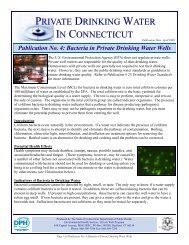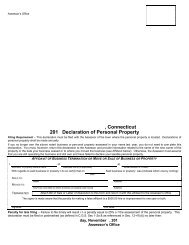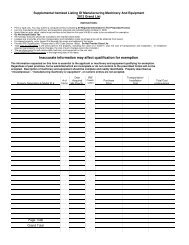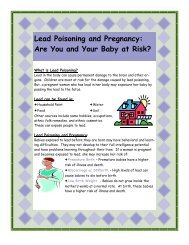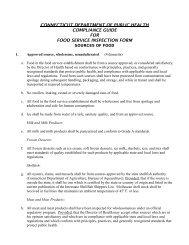Metallic Mercury: Health Effects Fact Sheet - CT.gov
Metallic Mercury: Health Effects Fact Sheet - CT.gov
Metallic Mercury: Health Effects Fact Sheet - CT.gov
Create successful ePaper yourself
Turn your PDF publications into a flip-book with our unique Google optimized e-Paper software.
♦<br />
♦<br />
♦<br />
♦<br />
Long-Term (Chronic) Exposure<br />
Shakiness<br />
Psychological<br />
changes<br />
Difficulty sleeping<br />
Loss of appetite<br />
with weight loss<br />
♦<br />
♦<br />
♦<br />
♦<br />
♦<br />
Irritability<br />
Excessive shyness<br />
Emotional instability<br />
Headache<br />
Short-term memory<br />
loss<br />
Fetal exposure is of particular concern because<br />
mercury can become trapped in the developing<br />
brain. This impairs brain development, and<br />
effects may show up months to years after the<br />
exposure stops.<br />
<strong>Metallic</strong> mercury vapor may irritate the lining of<br />
mouth and lungs. This can cause a metallic taste<br />
in the mouth, chest tightness, cough, and burning<br />
sensation in the lungs. These symptoms can<br />
either be from short term exposure to high levels<br />
of mercury vapor (hours), or from longer term<br />
exposure to low levels over weeks or months.<br />
Other symptoms of exposure include nausea,<br />
vomiting, diarrhea, increases in blood pressure or<br />
heart rate, skin rashes, and eye irritation.<br />
Who is at highest risk?<br />
Children and pregnant women are at highest risk<br />
if exposed, because the central nervous system is<br />
not fully matured in children and fetuses . Also,<br />
since mercury vapor is heavier than air, it tends to<br />
settle to the floor. This puts children at increased<br />
risk, because they are closer to the ground and are<br />
more likely to breathe mercury vapor which has<br />
settled. They also tend spend more time sitting or<br />
lying on carpets or other flooring. Children<br />
exposed to mercury for long periods of time may<br />
develop a disorder called acrodynia, or pink<br />
disease. This looks like an abnormal red rash<br />
with peeling of hands, nose, and soles of the<br />
feet. Other symptoms may follow, including<br />
excessive sweating or drooling, fretfulness,<br />
weakness, sleeplessness, irritability, fast heart<br />
rate, or increased blood pressure. Rarely,<br />
acrodynia can occur in teens and adults.<br />
What if I was exposed or have<br />
symptoms?<br />
If you or other household occupants have been<br />
exposed to mercury and are experiencing any<br />
symptoms described in this handout, contact<br />
your doctor. Be sure to tell him/her about<br />
your exposure to metallic mercury. There are<br />
laboratory tests that can help evaluate your<br />
level of exposure. Your doctor can order a<br />
urine mercury level to evaluate long-term<br />
exposure. A blood test is sometimes done to<br />
evaluate high-level, short-term exposures.<br />
However, these tests are not recommended for<br />
most home, school, or office exposures.<br />
What about treatment?<br />
Medical treatment is not needed for most of the<br />
exposures from spills in homes or schools that<br />
come from small quantities of mercury (like<br />
broken thermometers or fluorescent bulbs). If<br />
you are exposed to large amounts, or your<br />
exposure lasts for weeks, months, or years, you<br />
should talk to your doctor about treatment<br />
options.<br />
More <strong>Mercury</strong> Information<br />
For information about cleaning up broken<br />
thermometers or compact fluorescent bulbs<br />
(CFLs), mercury action levels for indoor spills,<br />
and spill response in schools, please visit the<br />
<strong>CT</strong> DPH website:<br />
http://www.ct.<strong>gov</strong>/dph/mercury<br />
Important Phone Numbers<br />
<strong>CT</strong> Dept. Public <strong>Health</strong><br />
Environmental & Occupational <strong>Health</strong> Assessment Program<br />
860-509-7742<br />
<strong>CT</strong> Poison Control Center 800-343-2722<br />
<strong>CT</strong> Dept Environmental Protection<br />
Emergency Spills (24/7)<br />
UCONN <strong>Health</strong> Center<br />
Occupational & Environmental Medicine Clinic<br />
860-424-3338<br />
866-337-7745 (toll free)<br />
860-679-2893<br />
Yale Occupational & Environmental Medicine Clinic 203-785-4197<br />
September 2009 2




